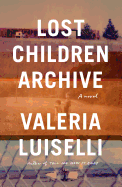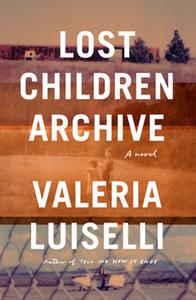
 In her spellbinding novel Lost Children Archive, Valeria Luiselli (Tell Me How It Ends) weaves a complex narrative from the migrant crisis on the southern U.S. border.
In her spellbinding novel Lost Children Archive, Valeria Luiselli (Tell Me How It Ends) weaves a complex narrative from the migrant crisis on the southern U.S. border.
At the story's center is an unnamed family traveling from New York City to Arizona. The mother and father are sound documentarians who met while recording a soundscape of the city. Now the father is focusing on lost Apache culture, determined to visit their homeland and record what he calls an "inventory of echoes." The mother is focusing her journalistic skills on the migrant crisis along the U.S.-Mexico border, specifically on finding the two lost children of her Latina friend back in New York. The couple's children, a five-year-old girl and 10-year-old boy, try to make sense of life on the road. Along the way the family shares stories, music, books and boxes full of their stuff. The point of view shifts from the mother to the boy and back again toward the end.
As much as the novel has large political themes, it begins as an astute study of marriage and family. The mother speaks elegantly of the family unit the four of them have formed, although she and the father have grown apart. The children begin to sense this rift and wonder what will happen at the end of the journey. The mother questions whether she'll stay in Arizona with her husband or return to New York. "Unhappiness grows slowly," says the mother. "It lingers inside you, silently, surreptitiously."
As the family travels farther on "the long, lonely roads of this country," the novel's sense of desolation widens. The family finds run-down towns strewn with the relics of late capitalism, and a citizenry afraid of "brownness," ready to blame poorer nations for their own problems. Underlying it all is a huge borderland haunted by vanished cultures, by migrant children who perished in the wilderness. As the parents become increasingly obsessed with their respective projects, the boy hatches a plan of his own, an attempt to get his parents' attention. He and his sister end up lost in the desert, leading to the novel's harrowing conclusion.
Lost Children Archive works on many levels. Luiselli breaks up her narrative with inventories, lists, quotes, maps, poems, photos, stories, statistics and more. These are blended into the book in a metafictional way so that, like her protagonists, Luiselli becomes an archivist of sorts, assembling reality from many disparate sources. The cumulative effect is powerful. Lost Children Archive is a haunting novel that illuminates timely issues. --Scott Neuffer, writer, poet, editor of trampset
Shelf Talker: Using documentary techniques, Valeria Luiselli blends political issues into an unforgettable portrait of an American family on the road.

